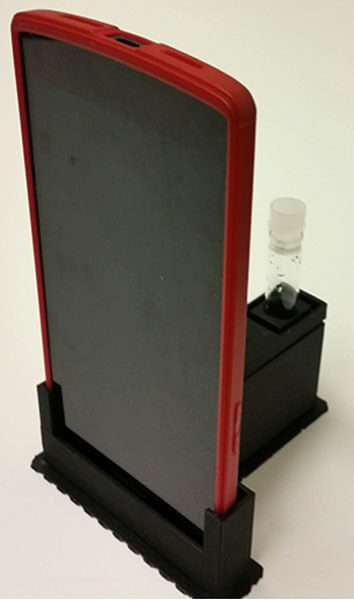May 15, 2018
Technology turns smartphones into on-the-spot detectors for foodborne illnesses, other dangerous contaminants
 Purdue technology, including a smartphone cradle, turns phones into on-the-spot detectors for foodborne illnesses. (Image provided)
Download image
Purdue technology, including a smartphone cradle, turns phones into on-the-spot detectors for foodborne illnesses. (Image provided)
Download image
WEST LAFAYETTE, Ind. – Purdue University researchers have developed detection technology that allows a typical smartphone to analyze produce for foodborne pathogens such as E. coli O157:H7, which has been linked to a deadly outbreak in romaine lettuce.
The technology involves both hardware – a smartphone cradle – and software in the form of an application that is downloaded on the phone. The combination allows the smartphone to be used as an on-site luminometer, an instrument used to measure light.
The lettuce or other produce is rinsed with an enrichment liquid containing a modified phage, a virus for bacteria. The phage then infects harmful foodborne bacteria so that when a substrate is added, they emit light, which is detected by the smartphone’s camera through the downloaded app and a green dot appears on the screen.
The cradle on the phone maximizes the photon collection by using diffusive reflection material to help capture a maximum amount of light, which may not be visible by the naked eye.
“This technology could be used on a farm or in a food processing factory to provide on-the-spot detection,” said Euiwon Bae, a senior research scientist in the Purdue School of Mechanical Engineering, who developed the technology along with Bruce Applegate, a professor in the Purdue Department of Food Science. “This rapid detection is critical for getting safe produce to consumers.”
The smartphone technology, coupled with the phage, helps reduce the typical amount of time it takes to test food samples for possible foodborne illnesses. The current process involves gathering a physical sample and then shipping it to a lab and waiting several days for the results.
The Food and Drug Administration estimates there are about 48 million cases of foodborne illness annually in the U.S. — the equivalent of sickening one in six Americans each year. These illnesses result in an estimated 128,000 hospitalizations and 3,000 deaths annually. Foodborne illnesses have been in the spotlight recently because of the deadly E. coli O157:H7 outbreak tied to romaine lettuce.
The special phage used with the smartphone technology was developed by Applegate and is being commercialized by Phicrobe, a Purdue University-affiliated startup founded by Applegate. The phage technology can be used to detect not only E. coli O157:H7, a harmful and potentially deadly strain, but also other foodborne pathogens that cause Listeria and Salmonella infection outbreaks. The phage technology also has applications for detecting contaminants in water.
“It’s sort of like reprogramming a computer,” Applegate said. “We take the technology and manipulate it to detect various harmful pathogens that are present.”
The U.S. Department of Agriculture provided some funding for the technology research, and part of the research was conducted by the Purdue Center for Food Safety Engineering. A patent application has been filed by the Purdue Office of Technology Commercialization, and the technology is available for licensing.
About Purdue Office of Technology Commercialization
The Purdue Office of Technology Commercialization operates one of the most comprehensive technology transfer programs among leading research universities in the U.S. Services provided by this office support the economic development initiatives of Purdue University and benefit the university's academic activities. The office is managed by the Purdue Research Foundation, which received the 2016 Innovation and Economic Prosperity Universities Award for Innovation from the Association of Public and Land-grant Universities. For more information about funding and investment opportunities in startups based on a Purdue innovation, contact the Purdue Foundry at foundry@prf.org. For more information on licensing a Purdue innovation, contact the Office of Technology Commercialization at innovation@prf.org. The Purdue Research Foundation is a private, nonprofit foundation created to advance the mission of Purdue University.
Purdue Research Foundation contact: Chris Adam, 765-588-3341, cladam@prf.org
Sources: Euiwon Bae, ebae@purdue.edu
Bruce Applegate, applegab@purdue.edu

